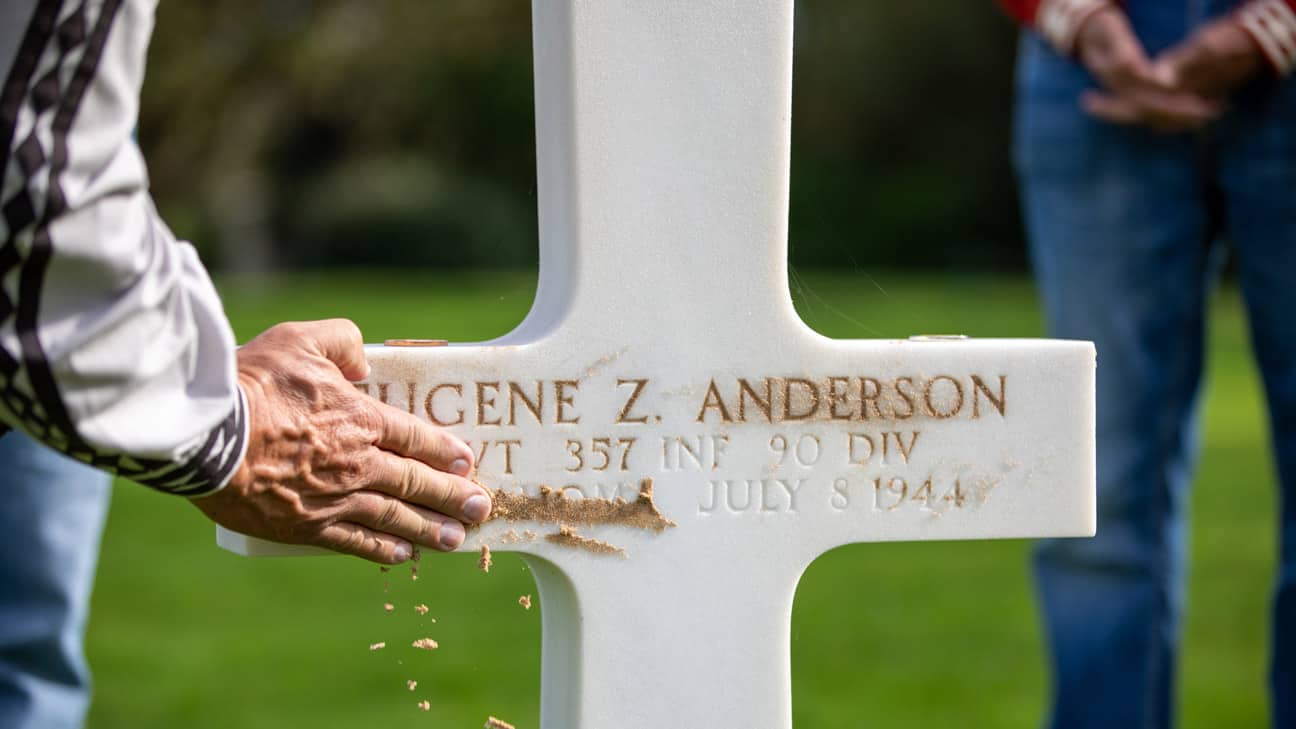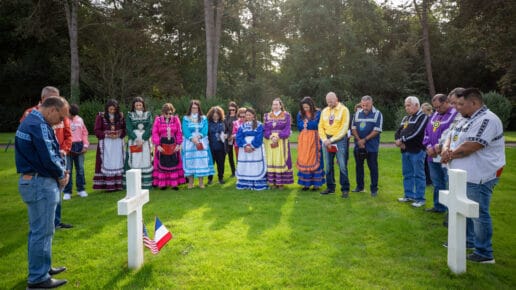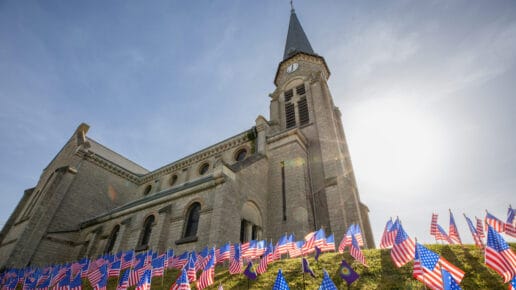[ad_1]
A Choctaw Nation of Oklahoma delegation recently traveled to St. Etienne, France, to commemorate the 105th anniversary of the WWI battle that liberated the city.
Choctaw code talkers were first used during this battle, and five Choctaw soldiers were among the 336 United States soldiers who sacrificed their lives during the four-day battle.
Chief Gary Batton commented on the significance of the events at this battle during a speech at the event in St. Etienne.
“These brave, young Choctaw warriors made the ultimate sacrifice and had no idea what their futures held when they shipped out to France. Each man fought valiantly when called upon to turn back the invading German forces at the four-day Battle of Sent Etienne,” he said. “Unfortunately, these brave warriors did not make it out of that battle and are forever remembered here. We will never forget the sacrifices made by these men and their families to ensure a better life for all.”
A monument now stands at Blanc Mont near St. Etienne and remembers these soldiers.

Photo by Christian Toews
Sand from Normandy beaches are rubbed into the headstones to highlight the soldier during the ceremony at the American Cemetery in Normandy, France.
Chief Batton was invited to lay a wreath at the base of this monument in their honor. This monument’s sign mentions the Choctaw Code Talkers and their contribution to winning the war.
Near this monument is Hill 140, where Joseph Oklahombi and other Code Talkers first used the Choctaw language to defeat the German army during WWI.
On October 8, 1918, Oklahombi and twenty-three fellow soldiers attacked an enemy position and captured 171 prisoners. They seized the artillery at the site and killed 79 German soldiers. These men tended their wounded comrades and held their position for four days under relentless attack.
In the days leading up to the ceremony in Saint Etienne, the delegation from the Choctaw Nation was able to visit many of the critical and historic sites where Choctaw soldiers fought in WWI and WWII. Two ceremonies were held at the cemetery of Meuse Argonne and the Normandy American Cemetery, respectively.
According to the American Battle Monuments Commission, the Meuse Argonne cemetery is 130.5 acres and holds the largest number of American military dead in Europe, totaling 14,246. Most of those buried here lost their lives during the Meuse-Argonne Offensive of World War I.
While visiting the graves of the Choctaw men buried here, the story of their bravery was read aloud.
A Choctaw hymn was sung at each grave, and a prayer was said.

Photo by Christian Toews
The Group of Choctaws from Durant, Oklahoma, bow their heads and pray at the American Cemetery in Normandy, France, where 10 Choctaw soldiers are buried.

Photo by Christian Toews
Five Choctaw flags stand among the 336 flags placed on the lawn in front of the church at St. Etienne. These flags represent the 336 soldiers lost in the Battle of St. Etienne.
The delegation also took sand from Normandy and filled in the soldier’s name on the headstone. This is a practice that highlights the name until the wind and the rain wash the sand away.
Choctaw coins were placed on the headstones, and small flags were planted at the base of the headstones.
At Normandy, the group visited a few sites along the beach where the Americans landed during D-day. Many of the bunkers and craters from bombs have been preserved, and the group visited and stood in the spot where this great and terrible day transpired.
John Hobbs, Senior Executive Officer of Communications and former Executive Director of Public Safety at Choctaw Nation, said, “My thoughts drifted to the fear our soldiers must have felt as they faced this unbelievable battle. As true Tvshkas, though, they buried their fear and continued to push forward. As a veteran myself, I understand and greatly appreciate the ultimate sacrifice they made on that battlefield. They left home as young men but, on that day, they became heroes that help change the course of history.”
Next, the group went to the Normandy American Cemetery, which covers 172.5 acres and contains the graves of 9,387 American military dead. Most of these men lost their lives in the D-Day landings and ensuing operations, including Choctaw men who fought against tyranny.
The people of France hold the sacrifice of the Choctaw men in high regard. Many French locals had a vast knowledge of the Choctaw’s contribution to the war.
They were eager to share tangible history with the Choctaw people who visited. The mayor of St. Etienne spoke about how grateful she was for the Choctaw people in her speech at the wreath-laying ceremony on Mount Blanc.
While this trip was primarily about honoring the Choctaw veterans and preserving their memory, it offered a deeper connection between the French and Choctaw nations.
Officials from the French government invited Chief Batton and Assistant Chief Austin to engage in government-to-government meetings. The Chiefs met with Philippe Letrilliart, Deputy Director for the Americas at the Ministry of Europe and Foreign Affairs. They also met with the Ministry of Agriculture and Food Sovereignty.
“We hope these talks produce opportunities to expand culture and business opportunities for our tribe as well as show that we are having Nation to Nation negotiations to secure our sovereignty. We have had relationships with France and Ireland (since the 18th century),” said Chief Batton in a Facebook post. “We expect to have several more opportunities to demonstrate Choctaw culture and enhance our relationships as a Nation during this trip.”
During the first day in France, the group visited the Musee du Quai Branly in Paris. This museum houses some of the earliest known Choctaw artifacts. These items will be loaned to the Choctaw Cultural Center in Durant, Oklahoma, for a temporary exhibit sometime next year.
The delegation was able to meet with the curator of the Musee du Quai Branly and discuss the history of the items as well as plans for further collaboration.
The Choctaw Nation has long held the “Tushka” or warrior in high regard. The fearless acts of courage these men showed in pivotal battles during the two world wars will not be forgotten.
These men fought alongside their fellow countrymen to ensure the future we have today. Many didn’t get the privilege of coming home from France, but their memory and honor have been carried across the ocean in the hearts of all who attended the ceremony.
“Seeing the names on the graves of the men from my hometown of Smithville, the ones from McCurtain County, and all those from the Choctaw Reservation or Southeastern Oklahoma was very emotional and something I’ll never forget,” said Shauna Williams, Executive Director of Communications at Choctaw Nation.
It is difficult to overstate the significance of the Choctaw soldier’s contribution to the efforts of WWI and WWII.
From the Code talkers who prevented information from being intercepted to the truly heroic acts of bravery, these Choctaw warriors helped to change the course of history.
[ad_2]
Source link
